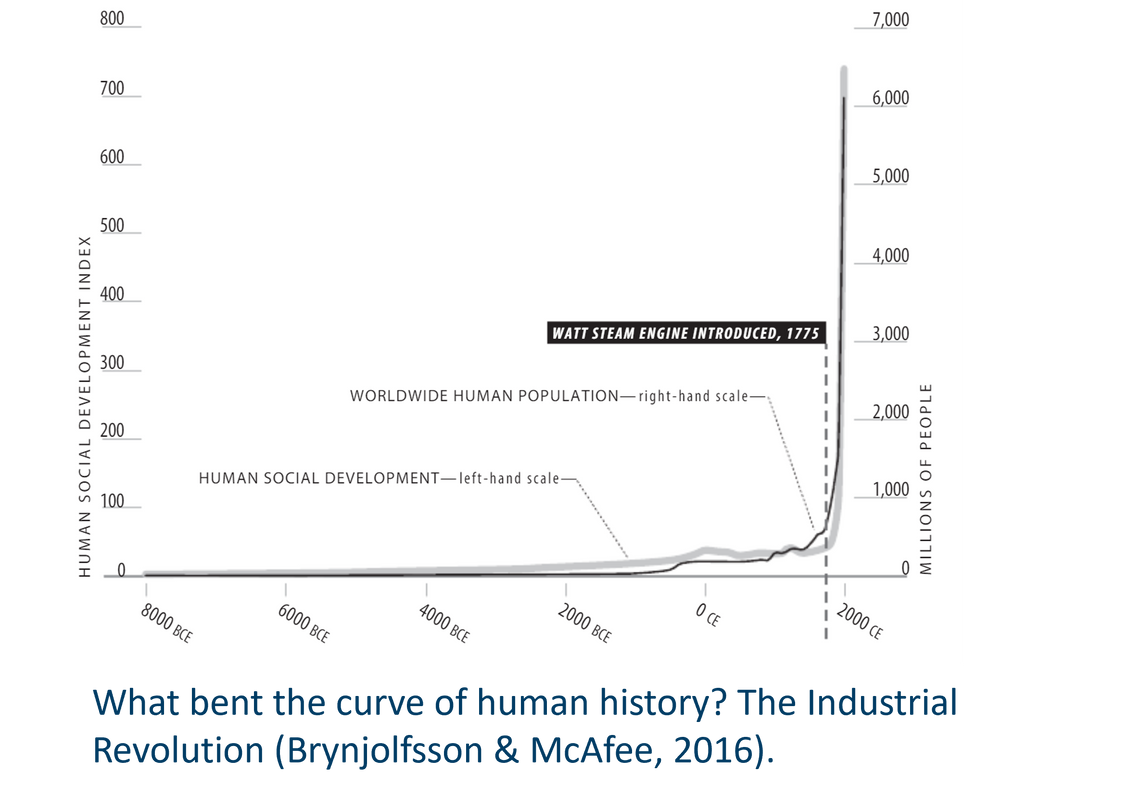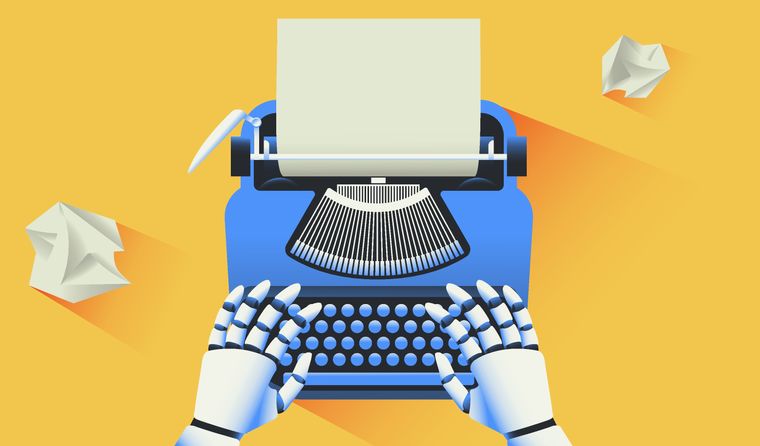How to survive AI… the skills we need to stay relevant: Part 1
AI has long promised to change the way we live, but until now, it has remained as technology at the margins. Not anymore! Ian Morris, in his book ‘Why The West Rules’, sums up human progress as ‘almost invisible until it isn’t’.

Article series
How to Survive AI … the skills we need to stay relevant
- How to survive AI… the skills we need to stay relevant: Part 1
- How to survive AI… the skills we need to stay relevant: Part 2
- How to survive AI… the skills we need to stay relevant: Part 3
- How to survive AI... The skills necessary to stay relevant: Presentation
AI has long promised to change the way we live, but until now, it has remained as technology at the margins. Not anymore! Ian Morris, in his book ‘Why The West Rules’, sums up human progress as ‘almost invisible until it isn’t’. We are at another 1775 ‘Watt steam engine moment’. Slow and steady advancement is suddenly shattered by a major advance in technology.
The arrival of transformative AI heralded by its harbingers ChatGPT and Bard points to 2023 as an inflection point in human history and AI and will turn the world (and insight industry) on its head.

In this three-part article, we will initially look at how generative AI has become such a seismic event with massive implications for the insight industry, the economy and society more broadly. In Part Two, we will look at how recent developments are changing the structure of the overall business support sector: what is happening to the worlds of insight, marketing and strategic consultancy. And in the final Part Three, we will look at the power skills that insight professionals now need to survive, stay relevant and excel in the generative AI world.
It is legitimate to bring out the paradigm word again!
A number of years ago, we wrote an article entitled ‘If I hear the word paradigm again, I will shoot myself!’ which was expressing frustration about every twist and turn in the development of market research being announced as a new paradigm. But now it really is time to dust down the paradigm word and accept that we are facing a massively disruptive event that only comes along once every few generations.
Let's look at what's been happening.
The steam engine announced the arrival of the first Industrial Revolution, which saw manufacturing processes push out craft and artisan production. The economy grew in the aggregate, but well-established sectors and a way of life disappeared, never to return. The second and third revolutions saw the rise of mass production and then information technology to automate production. Each continued to winnow out businesses, industries and sectors ill-prepared for the future they brought. As Carl Sagan once observed that “extinction is the rule, survival is the exception”.
This fourth revolution - the dawning of the age of transformative AI has got an extra kick to it. The previous revolutionary inflection points were essentially about enabling human endeavour. But with transformative AI, we now have a technology that is moving from playing an enabler role to being a substitute for human endeavour. And we are still in the ‘foothills’ of this technology, which is going to challenge what it is to think, feel, work and live. Research published by Goldman Sachs forecasts that the widespread adoption of AI could significantly boost labour productivity and increase global annual gross domestic product by 7% … but at what cost?
The change that this fourth industrial revolution (or Industry 4.0) will bring, its speed, scale, scope and complexity, has no historical precedent and will disrupt every industry to a greater or lesser extent. And this is scary as it also brings into sharp focus a point made by Erik Brynjolfsson (Professor and Senior Fellow at the Stanford Institute for Human-centered AI) that ‘there's no economic law that says that when technology advances everybody necessarily benefits, some people, even a majority of people, could be made worse off’.
A recent open letter from 1,000 plus academics, politicians and tech industry luminaries claimed that we are “locked in an out-of-control race to develop and deploy ever more powerful digital minds [which could] pose a risk to society”.
This prospect - the power of AI to substitute us, humans - puts the spotlight firmly on our ability to grow our businesses, industries and the economy in a way that will create wealth. We have a (possibly brief) opportunity to regroup and figure out how to structure our organizations (and society more broadly) to ensure we can not only survive transformative AI but thrive because of it.
Judging the rate at which AI will become a substitute for insight skills, not just an enabler
Interestingly, in anticipation of the massive changes that were coming down the road for insight, the authors in their ESOMAR Toronto Congress 2022 paper, written only a few months before the arrival of ChatGTP, used scenario planning to map out some plausible possible futures for the industry so we could at least prepare.
In doing this, we worked with the notion that the future is a function of these ‘three arrows in time’ (Ramirez and Wilkinson).

Arrow one – which we called ‘Power Trends’ - is about understanding things that come from the past and may eventually catch up with us – examining powerful trends that are likely to shape our future.
Arrow two – what we called our ‘Accelerating Present’ focuses on the future result of today’s actions – so we might examine (for example) the impact on our future selves of today’s investment in elements of technology. So how may what Zuckerberg is doing with augmented reality technology today impact what the rest of us will be doing tomorrow?
This brings us to arrow three – ‘Critical Uncertainties’. This is an ability to read or imagine the future coming towards us - the big things or events heading in our direction.
In developing our scenarios, we were clearly aware of ‘AI’ as one of the factors on the horizon. So, in building our different scenarios for the future, we assumed that AI would be gradually eased in, working as an enabler over a few years. There would be some time for the insight industry to adjust to the fact that AI would become a substitute for certain insight skills.
But what, in fact, happened was that capable AI exploded into the zeitgeist almost overnight and has us scrambling to understand its ramifications and how, as a substitute for human endeavour, it will profoundly change our world. Our fundamental 2022 thesis that ‘insight professionals following the ‘business as usual’ model were doomed to failure and needed to pivot quickly’ held up. It just came about faster than we had anticipated.
As we argued, the biggest and brightest future will be for those insight professionals who can operate as ‘polymaths’ able to see the big business picture and join up all the dots. But what we, like so many others, didn't appreciate was the speed with which the need for these polymath skills would come about. It is these power skills that will differentiate us from what AI can offer.
So, in the next part of the article, we'll look at the implications of this genuine paradigm shift, starting by looking at how AI is changing where insight fits into the overall business services support sector: marketing, insight, and strategic consultancy, picture. We then conclude with a ‘call to arms’ … a deep dive into the power skills that are needed to survive this AI revolution.
David Smith
Director at DVL Smith LtdDavid Smith is a Director of DVL Smith. He is also a Professor at the University of Hertfordshire Business School. He holds a PhD in Organisational Psychology from the University of London and is a Graduate Member of the British Psychological Society.
He is a former Vice President of ESOMAR and also a former Chairman of the UK Market Research Society (MRS).
He is a Fellow of the Market Research Society, a Fellow of the Chartered Institute of Marketing and also a Fellow of the Institute of Consulting. David is a Certified Management Consultant.
Adam Riley
Founding Director at Decision ArchitectsAdam Riley founded insight consultancy Decision Architecture Limited in 2006. His 25-year-plus career has spanned market research agencies, client-side roles and management consultancy. Adam joined TN-AGB in the early nineties, before moving to RSL in its embryonic international research team.
After an MBA at The London Business School, he joined Samsung in South Korea, as a Global Marketing Strategist, before moving back to London and becoming a senior member of the marketing strategy practice of Monitor Company (now part of Deloitte).
Article series
How to Survive AI … the skills we need to stay relevant
- How to survive AI… the skills we need to stay relevant: Part 1
- How to survive AI… the skills we need to stay relevant: Part 2
- How to survive AI… the skills we need to stay relevant: Part 3
- How to survive AI... The skills necessary to stay relevant: Presentation


